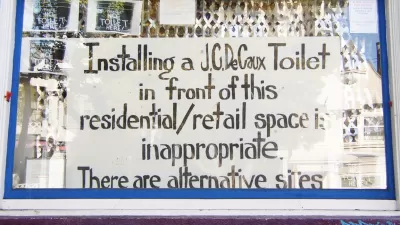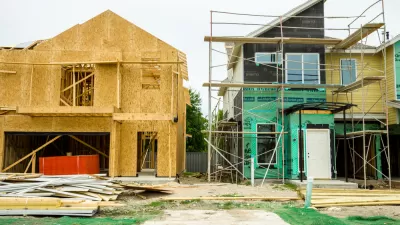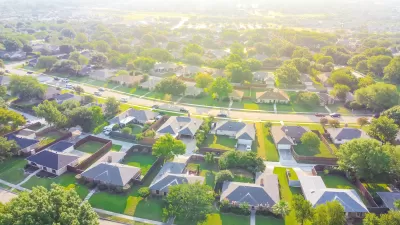Homeowners' desire for more expensive land does not justify the "NIMBY veto" over new development.

When I posted about the logic (and illogic) of NIMBYism in March, I got a bucketful of responses on this blog—some friendly, some hostile.
One of the most interesting critiques of my article asserted that zoning "protects property values and assures a measure of continuity. If you want people to invest their hard-earned dollars in buying and improving properties in your city, you are going to have to accept the fact that those property owners are going to want a voice when future developments that will impact them, their property and their neighborhood are considered." In other words, if homeowners get a veto over new development, they (1) are more likely to invest in land because if so they (2) will benefit from increased property values.
The first argument seems persuasive on the surface; in the 1920s real estate developers often favored zoning because it would "protect" their investments from allegedly incompatible uses. Nevertheless, landowners are in fact perfectly willing to invest in places without zoning. American cities were able to develop and expand without much difficulty before zoning—and in Houston (which lacks a formal zoning code)* housing development is actually more common than in some highly restrictive cities. Between 2006 and 2010, the number of residential building permits in Houston ranged between 12 and 38 per 1000 people—lower than the statewide average, but higher than in many other urban centers, including highly restrictive San Francisco and similar-but-zoned cities such as Dallas.
The second argument has a stronger element of truth; it does seem to me that highly restrictive zoning allows homeowners to essentially form a cartel, restricting the supply of homes and apartments and raising rent and housing prices (or to use a more widely accepted euphemism "property values"). To draw an analogy: if government allowed Target and Wal-Mart to veto all new stores within a mile of any Target or Wal-Mart, the prices of all goods sold by Target and Wal-Mart would certainly rise.
But do you really want to live in a society where zoning-as-cartel succeeds? In places like San Francisco and New York, a complex and restrictive zoning process contributes to sky-high housing prices, which in turn means that many middle-class people feel forced to move out of the city, and lower-class people who cannot afford high rents sleep in homeless shelters or on the streets. And because multifamily housing is nearly always more controversial than single-family housing, zoning affects rents even more than it affects home prices. Why, as a moral matter, should government price the poor and middle class out of the market so that existing homeowners can sell their houses for more? Or to go back to the Wal-Mart analogy: if Wal-Mart and Target persuaded zoning boards to prohibit competition from grocery stores and then raised food prices so high that poor and middle-class families were malnourished, would we consider this a morally acceptable result?
Moreover, zoning hasn't always succeeded in its aim of raising property values. In the 1920s, most Americans protected by zoning lived in what we would today call urban and inner suburban neighborhoods. Some of those neighborhoods have always had stable property values—but others witnessed a catastrophic drop in property values in the second half of the 20th century, as "white flight" (and later "black middle-class flight") reduced demand for housing. And in the 2000s, the collapse of a housing bubble has led to drops in housing prices over the last five or ten years. Even in supposedly gentrifying Brooklyn, housing prices in some places are lower than in 2004. Thus, zoning occasionally fails even by its own criteria.
In sum, zoning doesn't always increase property values—and when it does, it sometimes is too successful.
*One common counterargument is that Houston's low housing prices are the result of highway-induced sprawl, and that it may be impossible to have lower housing prices without high transportation costs. I note that other cities with zoning have equally car-dependent urban form.

Maui's Vacation Rental Debate Turns Ugly
Verbal attacks, misinformation campaigns and fistfights plague a high-stakes debate to convert thousands of vacation rentals into long-term housing.

Planetizen Federal Action Tracker
A weekly monitor of how Trump’s orders and actions are impacting planners and planning in America.

In Urban Planning, AI Prompting Could be the New Design Thinking
Creativity has long been key to great urban design. What if we see AI as our new creative partner?

Cal Fire Chatbot Fails to Answer Basic Questions
An AI chatbot designed to provide information about wildfires can’t answer questions about evacuation orders, among other problems.

What Happens if Trump Kills Section 8?
The Trump admin aims to slash federal rental aid by nearly half and shift distribution to states. Experts warn this could spike homelessness and destabilize communities nationwide.

Sean Duffy Targets Rainbow Crosswalks in Road Safety Efforts
Despite evidence that colorful crosswalks actually improve intersection safety — and the lack of almost any crosswalks at all on the nation’s most dangerous arterial roads — U.S. Transportation Secretary Duffy is calling on states to remove them.
Urban Design for Planners 1: Software Tools
This six-course series explores essential urban design concepts using open source software and equips planners with the tools they need to participate fully in the urban design process.
Planning for Universal Design
Learn the tools for implementing Universal Design in planning regulations.
Appalachian Highlands Housing Partners
Gallatin County Department of Planning & Community Development
Heyer Gruel & Associates PA
Mpact (founded as Rail~Volution)
City of Camden Redevelopment Agency
City of Astoria
City of Portland
City of Laramie






























